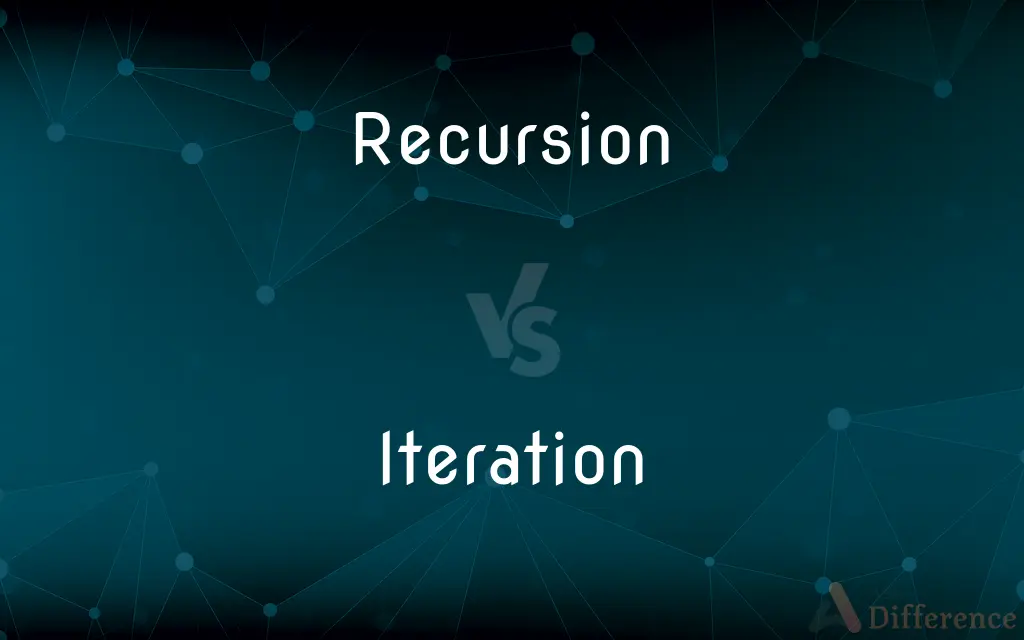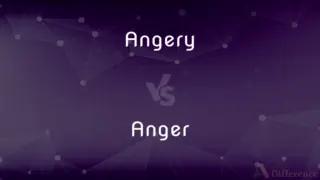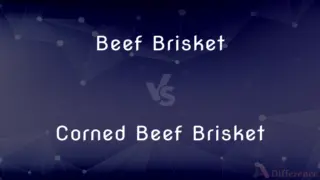Recursion vs. Iteration — What's the Difference?
By Maham Liaqat & Urooj Arif — Published on July 10, 2024
Recursion involves a function calling itself to solve smaller instances of the same problem, whereas iteration solves a problem through loops, repeating a block of code until a condition is met.

Difference Between Recursion and Iteration
Table of Contents
ADVERTISEMENT
Key Differences
Recursion is a programming technique where a function calls itself with a smaller portion of the problem, gradually reducing the problem size until it reaches a base case, terminating the recursive calls. In contrast, iteration relies on loops (such as for, while, or do-while loops) to repeat a sequence of operations until a certain condition is met. Iterative solutions are generally more efficient in terms of memory usage since they do not incur the overhead of multiple function calls and stack management.
Recursion can lead to elegant, easy-to-understand code for complex problems but may suffer from higher memory usage due to the maintenance of multiple call stacks. Iteration is typically used for straightforward tasks that require repeating actions a specific number of times or until a particular condition changes.
While recursion can provide a more intuitive solution for problems with a recursive nature, it might lead to performance issues such as stack overflow if the recursion depth is too large. Iteration, on the other hand, is often preferred for its efficiency and simplicity in scenarios where a recursive approach is not inherently required or when optimizing for memory and execution speed.
The choice between recursion and iteration depends on the specific problem, readability concerns, and efficiency requirements. Some languages and compilers optimize tail recursion (a recursion where the recursive call is the last operation in the function), making it as efficient as iteration in certain cases. However, in general, recursion is best suited for problems that are naturally hierarchical or divide-and-conquer, while iteration is favored for linear task processing where explicit looping constructs can be easily applied.
Comparing recursion and iteration, recursion's main advantage lies in its ability to simplify code for complex algorithms by breaking them down into simpler, identical sub-problems. Iteration, with its straightforward looping mechanism, excels in scenarios requiring straightforward, sequential processing, offering better memory efficiency and potentially faster execution times.
ADVERTISEMENT
Comparison Chart
Basic Concept
Function calls itself to solve sub-problems
Uses loops to repeat actions until a condition is met
Memory Usage
Higher due to call stack maintenance
Lower as it uses a single execution context
Use Cases
Divide-and-conquer problems, tree traversals
Linear data processing, simple repetition
Efficiency
Can be less efficient due to overhead
Generally more efficient in memory and speed
Readability
Can simplify code for complex problems
Straightforward for linear processes
Potential Issues
Risk of stack overflow, higher memory usage
Can be less intuitive for hierarchical data structures
Optimization
Tail recursion optimization in some environments
Typically optimized by compilers
Example
Calculating factorial, traversing a file system
Counting elements, summing an array of numbers
Compare with Definitions
Recursion
Recursion is when a function calls itself to break down a problem.
A recursive function to calculate factorial n! reduces the problem to n * (n-1)!.
Iteration
Iteration repeats a block of code using loops.
Using a for loop to sum the elements of an array.
Recursion
Recursion can lead to elegant solutions.
Implementing quicksort or mergesort algorithms recursively simplifies complex sorting logic.
Iteration
Efficient for tasks with clear repetition.
Iteratively counting from 1 to 10 using a while loop.
Recursion
Requires a base case to prevent infinite loops.
A recursive search stops when the target element is found.
Iteration
Generally more memory-efficient than recursion.
Iterative solutions for factorial computation use less stack space.
Recursion
It's used for naturally hierarchical problems.
Recursively traversing a directory tree to list all files.
Iteration
Offers speed advantages in many cases.
An iterative version of the Fibonacci sequence calculation is often faster than its recursive counterpart.
Recursion
Can suffer from high memory use and stack overflow.
Calculating the factorial of a very large number recursively might exceed the call stack limit.
Iteration
Suited for linear data processing.
Processing each character in a string sequentially with a loop.
Recursion
A method of defining a sequence of objects, such as an expression, function, or set, where some number of initial objects are given and each successive object is defined in terms of the preceding objects. The Fibonacci sequence is defined by recursion.
Iteration
The act or an instance of iterating; repetition.
Recursion
A set of objects so defined.
Iteration
The process of repeating a set of instructions a specified number of times or until a specific result is achieved.
Recursion
A rule describing the relation between an object in a recursive sequence in terms of the preceding objects.
Iteration
(computing) The use of repetition in a computer program, especially in the form of a loop.
Recursion
(programming) The invocation of a procedure from within itself.
This function uses recursion to compute factorials.
Iteration
(computing) A single repetition of the code within such a repetitive process.
The code calculates the appropriate value at each iteration.
Recursion
The act of recurring; return.
Iteration
(computer science) a single execution of a set of instructions that are to be repeated;
The solution took hundreds of iterations
Iteration
(computer science) executing the same set of instructions a given number of times or until a specified result is obtained;
The solution is obtained by iteration
Common Curiosities
What is recursion in programming?
Recursion is a method where a function calls itself to solve smaller instances of the same problem until it reaches a base case.
Why might recursion cause a stack overflow?
Recursion might cause a stack overflow if the depth of recursion is too great, exceeding the memory allocated for the call stack.
What is a base case in recursion?
A base case is a condition that stops the recursion by not making any further self-calls, thus preventing infinite loops.
Can every recursive function be rewritten iteratively?
Yes, theoretically, every recursive function can be rewritten using iterative constructs, though the complexity and readability might vary.
What makes iteration more efficient in certain cases?
Iteration is more efficient in terms of memory usage and can be faster because it avoids the overhead of multiple function calls and stack management.
Why use iteration over recursion?
Iteration is often more memory-efficient and can be faster for tasks that do not naturally fit the recursive problem-solving model.
How does tail recursion optimization affect performance?
Tail recursion optimization by compilers can make recursive functions as memory-efficient as iterative solutions by reusing the same stack frame for recursive calls.
In what scenarios is recursion preferred?
Recursion is preferred for problems that are naturally hierarchical or can be divided into similar sub-problems, such as tree traversals or divide-and-conquer algorithms.
How do you choose between recursion and iteration?
The choice depends on the problem's nature, the importance of code readability, and efficiency requirements. Recursion is often chosen for its simplicity in complex problems, while iteration is preferred for its performance advantages.
What are examples of problems better solved recursively?
Examples include binary tree traversals, sorting algorithms like quicksort and mergesort, and problems based on the divide-and-conquer approach.
Share Your Discovery

Previous Comparison
Angery vs. Anger
Next Comparison
Beef Brisket vs. Corned Beef BrisketAuthor Spotlight
Written by
Maham LiaqatCo-written by
Urooj ArifUrooj is a skilled content writer at Ask Difference, known for her exceptional ability to simplify complex topics into engaging and informative content. With a passion for research and a flair for clear, concise writing, she consistently delivers articles that resonate with our diverse audience.













































